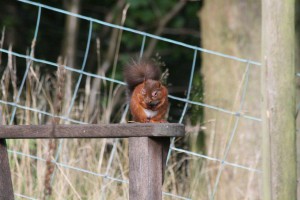Sadly we have to report that cases of the squirrelpox virus have been found in Little Langdale, Kentmere and around the Grasmere area. This demonstrates just how important it is to keep red and grey squirrel populations apart. Grey squirrels are unaffected by the squirrelpox virus, but they pass it on to red squirrels where it can decimate a local red population, with infected red squirrels suffering a slow and painful death within a couple of weeks. Grey squirrels travel long distances looking for new territories so the disease could spread to other areas very quickly if not kept in check. Natural food isn’t as plentiful this year as last, another reason for squirrels to be on the move.
We expect some of the red squirrels to survive in the areas recently affected by the virus, and the populations to recover in future years, but we need to keep up our efforts to protect them. Our volunteers are working very hard to control the spread of grey squirrels – this is not something we relish, but is currently the only way to ensure our red squirrels can survive here in South Lakeland. The practical and financial support from local residents and our members is vital for our work to continue, and if you can help in any way we’d be delighted to hear from you.
Please let us know immediately if you spot a squirrel which might have the squirrelpox disease. An infected red squirrel exhibits a slower/unsteady movement on the ground, when climbing, getting food and when eating. This gets worse as time goes on and they may stay around the area of a feeder or even inside it. They don’t run away quickly when a human approaches. If there are still healthy squirrels running about the contrast is more noticeable. There may be no visible marks to indicate squirrelpox, but often there are lesions and swelling around the eyes and mouth as shown in the photo – click on it to enlarge.
If you see a red squirrel showing signs of the disease, please contact us immediately on 07836 584201 or any of the other numbers on our Contact page.
All donations to help our red squirrels are most welcome, however small. You can donate here>>





